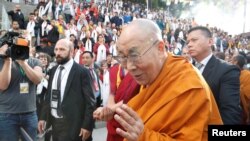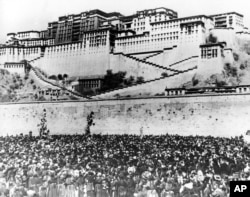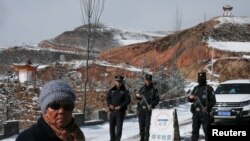The leader of Tibetan Buddhism says it is possible that when he dies, the next Dalai Lama might be found in India. He also said that if China appoints the next Dalai Lama, the choice would not be respected.
The Buddhist leader spoke to the Reuters news agency from Dharamshala, India, where he has lived in exile for 60 years.
On Sunday, Tibetans in that town marked the anniversary of the Dalai Lama’s escape from Lhasa in Tibet. He fled to India in early 1959 after a failed attempt to end Chinese rule in the area. He has since worked to gain worldwide support for self-rule for Tibet.
China took control of the territory in 1950. It considers the 83-year-old Buddhist leader and Nobel peace prize winner a dangerous separatist.
China has argued that its leaders have the historical right to approve the Dalai Lama’s successor. The Dalai Lama told Reuters China may try to do so after he dies.
“China considers Dalai Lama’s reincarnation as something very important. They have more concern about the next Dalai Lama than me,” he said.
Tibetan tradition says that the spirit of the highest Buddhist clergyman is reincarnated upon death in the body of a child. Many Tibetans suspect any Chinese involvement in the process would be a trick to try to influence the community.
Born in 1935, the current Dalai Lama was identified as the reincarnation of his predecessor when he was two years old.
Many of China’s more than 6 million Tibetans continue to honor the Dalai Lama, although the government has banned public demonstrations of support.
Up for discussion
The Dalai Lama said that contacts between Tibetans living in their homeland and in exile were increasing. But he said there have been no official meetings between Chinese officials and his top assistants since 2010.
However, some retired Chinese officials and businessmen with ties to China’s government visit him from time to time, he added.
He said the future of the Dalai Lama tradition could be discussed during a meeting of Tibetan Buddhists in India later this year.
“If the majority of (Tibetan people) really want to keep this institution, then this institution will remain,” he said. “Then comes the question of the reincarnation of the 15th Dalai Lama.”
He added that a new Tibetan Buddhist leader would continue to have “no political responsibility.” The Dalai Lama surrendered his political duties in 2001, developing a democratic system for the up to 100,000 Tibetans living in India.
Love of science
During the interview, the Dalai Lama also spoke excitedly about his love for several sciences, including the study of the brain and physics, the laws of nature.
He said that if he were ever permitted to visit Tibet, he would like to speak about such subjects at a Chinese university.
The Dalai Lama was born in a village on the northeastern edge of historical Tibet, in China’s Qinghai province.
During a recent Reuters visit there, police armed with machine guns blocked the road. Police and other officials said the village was not open to non-locals.
“Our strength, our power is based on truth. Chinese power based on gun,” the Dalai Lama said. “So for short term, gun is much more decisive, but long term truth is more powerful.”
I’m Caty Weaver.
Reuters reported this story. Caty Weaver adapted it for VOA Learning English. George Grow was the editor.
We want to hear from you. Write to us in the Comments section, and visit our Facebook page.
____________________________________________________________
Words in This Story
reincarnation - n. the idea or belief that people are born again with a different body after death
predecessor - n. a person who had a job or position before someone else
institution - n. a custom, practice, or law that is accepted and used by many people
interview - n. a meeting between a reporter and another person in order to get information for a news story







